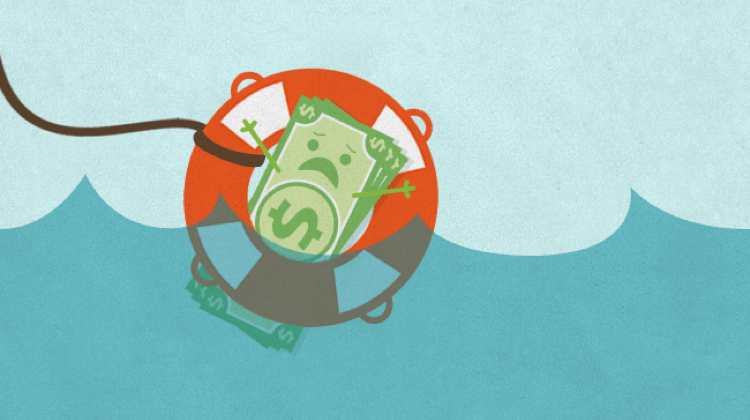How To Live On Disability Even If You Are Broke

I’m sure you know firsthand how hard it can be to live on disability benefits when it’s your only source of income. But like most disabled people, you do what you can to make it work, right? Well, I assume you’re here because you want to know if there’s a better or easier way (hint: there is!)
This article will show you how to live on disability in ways you might not have thought about before. Will you be able to take a three-week vacation in Belize? Probably not, but you’ll learn what matters most — how to stay afloat during tough times.
To this end, I’ll touch on the importance of budgeting, ideas on how to save money, getting more financial help, and earning extra income to help pay your bills.
Okay, let’s get going!
DETERMINE YOUR WEEKLY BUDGET
The first thing to do is figure out precisely how much money you have coming in vs. going out every month, down to the cent if you can. For starters, let’s look at your expenses…
Fixed Expenses
These type of expenses are the same amount for every month of the year, such as:
- Rent
- Car payments
- Mortgage
- Homeowner’s insurance
- College loans
- Cable/internet
- Gym membership
Variable Expenses
These type of expenses vary slightly from month to month, such as:
- Food
- Car gas
- Utilities
- Pet care
Now, figure out the average cost of your variable expenses over the past three months(we’ll get back to this in a moment).
Other Expenses
You’ll also need to budget a certain amount of your benefits to other areas…
Medical Expenses
You should have enough money to leave at least 10% every month for unforeseen medical expenses, which works out to be somewhere between $60-$200 per month for most people on disability. Obviously, that’s a small pittance for big medical expenses in which case you may want to look into something like crowdfunding to make up for the difference.
Personal Expenses
I don’t need to tell you that living with a disability can be super challenging and that’s why it’s important to treat yourself to a little something to remember the small pleasures in life. So, set aside maybe 5% of your benefits every month for things like…
- Restaurants/Cafes
- Movies
- Hair salons
- Trinkets
Keep all your receipts in a folder for the next month to make sure you don’t overextend your “personal” budget. Remember, itemize everything!
Savings Plan
A long-term savings plan might seem impossible when you’re barely scraping by but it’s important to set aside a little money to it. Just $100 per month can make a difference!
You can set up an auto debit to move a small percentage of your benefits from your checking to savings account every month. And be sure to do the same when you receive unexpected money through things like birthdays or tax returns.
Let’s Do Some Simple Math!
Okay, now that you have a handle on your expenses, let’s add up the numbers…
Step 1 – Calculate Your Weekly Expenses
1. Add up your monthly expenses…
Fixed Expenses
Variable Expenses (average amount over 3 months)
+ Other Expenses (medical expenses, personal expenses, savings plan)
_________________________________________________________________________
= TOTAL MONTHLY EXPENSES
2. Multiply your TOTAL MONTHLY EXPENSES by 12 (for months) and divide that number by 52 (for weeks)
(TOTAL MONTHLY EXPENSES) x 12
____________________________________
52
= TOTAL WEEKLY EXPENSES
Step 2 – Calculate Your Weekly Benefits
1. Divide your MONTHLY DISABILITY BENEFITS by 30 (for average number of days per month)
(MONTHLY DISABILITY BENEFITS)
___________________________________
30
= DAILY DISABILITY BENEFITS
2. Take the daily total and multiply that by 7 to get the weekly amount
(DAILY DISABILITY BENEFITS) x 7 = WEEKLY DISABILITY BENEFITS
Step 3 – Compare Your Weekly Expenses to Weekly Benefits
So, which number is higher, your weekly expenses or weekly benefits? If your weekly expenses are higher, you’re already over budget in which case you’ll need to cut back on your fixed and/or variable expenses and possibly seek out governmental assistance.
The one area where you DON’T want to cut back on is the money you’re setting aside for medical/miscellaneous expenses and your savings plan.
The rest of this blog post will show you ways to lower your expenses and where to go for extra help if you need it. Once you apply them, recalculate your expenses to make sure you’re within your means.
GREAT WAYS TO SAVE MONEY ON DISABILITY
First of all, if you want to save money while on disability, you have to get over what other people think of you. So what if you can’t afford the latest iPhone or iPad? None of that matters. Right now, you should be concentrating on how to stretch your dollar and nothing else. With that said, here are some ideas to help get you started, in no particular order…
Switch/Opt-Out of Your Phone Service
Do you really need a landline if you already have a cell phone or smartphone? Not really. But if you feel better having it, look into services like magicJack or NetTALK DUO which allow you to make local and long-distance calls to the United States and Canada using your internet connection. Signing up with one of these services can save you up to 1K over the course of five years!
Also, think about switching to the most basic wireless plan with a limited amount of minutes as it can save you $50 or more per month.
You can even get more savings on both landline and wireless phone services by signing up with the federal program known as Lifeline phone service.
Switch/Opt-Out of Your Cable Service
If you’re like most TV viewers, you only watch a few of the hundreds of channels available to you. It’s a total waste of money! Why not go with a basic cable plan instead and watch everything else through websites like Hulu?
Opt for Budget Billing with Your Utility Company
You can work out a deal with your utility company wherein they take an average of your charges throughout the year so you pay a flat rate. This way, you’ll have no surprises and your utilities will now become a fixed expense instead.
Shop at Inexpensive Grocery Stores
Start shopping at discount grocery stores like Aldi’s, Walmart, or Kroger and/or use coupons if you don’t already.
Buy Household Items in Bulk
Next time you buy kitchen and bathroom items like soap, toothpaste, deodorant, cereal, and paper towels, buy them in bulk at stores like Costco — you’ll save money in the long run.
Order Online Where Possible
You can also save money on non-perishable household items by ordering products online through vendors like Amazon. But when it comes to things like books and DVD’s, visit your local library instead!
Buy Generic Medication Instead of Brand Names
Where possible, buy generic medication. Also, many pharmacies offer discount programs for around $20 per year which can potentially save you hundreds of dollars per month!
Give Up Your Smoking Habit
Besides potentially saving your life, did you know that giving up smoking can save you 1K or more per year? That’s nothing to sneeze at! In case you have a tough time quitting, try hypnosis as it’s helped a great number of people who’ve failed with other methods.
Buy Cheaper Clothes
Start shopping at discount retailers like T.J. Maxx and Marshalls. And, of course, you can always find inexpensive clothing at the Salvation Army and Goodwill too.
Get Your Hair Cut at a Hair School
I probably don’t need to tell you that hair salons are expensive so here’s something to try… Find a local hair school near you and see if they offer haircuts for free or at a reduced price with their students.
Get Cheaper Gym Membership
If you’re well enough to exercise or work out at a gym, sign up with YMCA or YWCA as they offer plans with reduced rates for low-income people.
Negotiate for Better Tax Rates/Insurance Plans
If you’re a homeowner, show your disability award letter to your property tax office as your county might be able to reduce your tax rate and freeze it there. Similarly, try the same thing with your auto insurance (assuming you drive less and accrue fewer miles). You can also inquire about bundling your car and home insurance as a way to save money.
Next, call your bank, explain your financial hardship, and ask if you can get a card that charges a lower interest rate. Just doing that could get you as much as an 8-9% reduction!
Stop Wasting Money on Rent
Have you heard about the tiny house movement? Think about this, you could own a home for what it costs to rent the average 1 bedroom apartment in a year within the United States (14K-18K)!
Move Abroad
If you’re the adventurous type, give thought to relocating overseas and spend only a third of what you pay now on rent, food and utilities!
WHERE TO LOOK FOR MORE FINANCIAL HELP
If you’re still going beyond your budget after making lifestyle adjustments, you can try applying to various governmental assistance programs to help pay your bills, such as these…
Housing Assistance
Apply for subsidized housing through Housing and Urban Development (HUD). As a voucher program, the wait can be quite long, averaging around two years, so it’s best getting on the list now if you think you need it. [source]
Food Stamps
If you’re a disabled person living below the poverty line ($3,250 or less in countable resources like a bank account), you can get on SNAP (Supplemental Nutrition Assistance Program).
Prescription Drugs
Apply for the Medicare prescription drug program for extra help which is separate from the Medicare Prescription Drug Plan (enrollment is also separate). You may qualify if you already receive Medicare Part A (Hospital Insurance) and/or Medicare Part B (Medicare Insurance).
Heat/Electricity
The U.S. Department of Health & Human Services may be able to help you with your home energy bills through the Low Income Home Energy Assistance Program (LIHEAP).
Student Loans
If you have student loans, you may be able to defer them for up to three years due to financial hardship. But keep in mind that interest will continue to accrue during this time. [source]
Other Programs
Try to schedule an appointment with a social services agency in your local area and speak to someone about other programs you’d be eligible to receive benefits for.
SUPPLEMENT YOUR DISABILITY INCOME
Even after crunching the numbers and taking action, you probably won’t have much left over by the end of the month, if at all.
That’s why it’s a good idea to get some kind of side income going, if possible…
Whether it’s renting out a room in your house/apartment, pet sitting, taking surveys or anything else, find a way to earn a few hundred dollars more per month. For more money-making opportunities, check out this post.
NOW IT’S YOUR TURN!
What can YOU do to save more money while living on disability? Leave your comments below!








